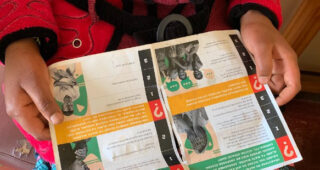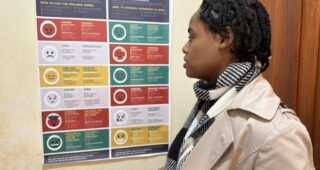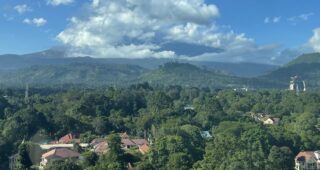Rebuilding Family Cohesion Through Connection
In Dodoma, Tanzania, social norms influence what it is acceptable for families to talk about. These norms, coupled with competing life demands and distractions like subsistence living and cooking, make it uncommon for families in Dodoma to sit together and discuss life and its challenges and joys.
This can leave adolescent boys and young men (ABYM) and adolescent girls and young women (AGYW), and those living with HIV, with a minimal opportunity to share and express themselves in meaningful ways with trusted members of their family.

Anna Manyanda is proud of the Manyanda family name; to her it is a surname that represents love, unity, and resilience. As a 46-year-old Community Health Worker (CHW) at Makole Hospital, Anna has relied on her resilience in more ways than one; she has a challenging job, a family that depends on her, and as someone living with HIV, she must also ensure she maintains her health by keeping up with her antiretrovirals. Anna is acutely aware of the realities of feeling overstretched by the competing demands of life and often has found herself wishing for better ways to cope, for both her and her children.
“Most of the time, we come back home late at night, and the children are already asleep…all we knew was to provide the children with money for school expenses and ensure there is enough food, said. Anna. “That’s what we considered to be our responsibilities; there is often no time to listen to what the child is saying or what problem they might have that we could help with.”
Leveraging Human Centered Design
The USAID Afya Yangu Northern Project in Tanzania aims to understand the realities people face and through collaborative engagement, improve the quality of life and solve complex challenges using human-centered design (HCD) alongside implementation activities.
HCD is a solutioning methodology to understand the needs, behaviors and experiences of people closest to a given challenge and was an obvious fit within this project. Following an evidence phase, which incorporated surveys, academic literature, discussions with implementing partners and stakeholders and a workshop in Dar es Salaam, the project launched the Empathy phase.
Immersions are guided conversations with individuals that have been mapped to represent key groups in the ecosystem of the challenge. The HCD team conducted immersions with different people across age, genders, and HIV status in all walks of life in Dodoma including leaders – religious and community, young people, parents, patrons, teachers, public health professionals and implementers, Ministry of Health and more. The insights that emerged shed light on experiences, perspectives, thoughts, feelings and beliefs about their daily lives, but also on the gaps in psychosocial support for navigating challenges as a young person living with HIV.
Notably, a lack of opportunity to express oneself with loved ones emerged not only as a common reality, but as a major emotional barrier to life, especially amongst those living with HIV.
Talk and Play
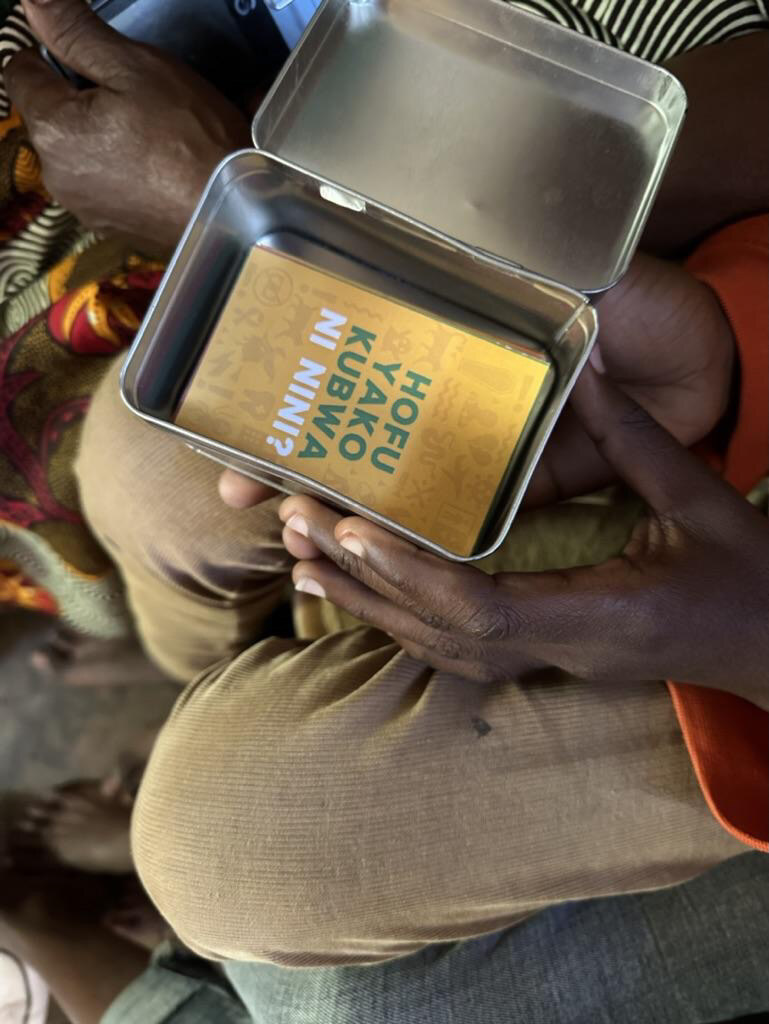
Through a co-creation process workshop, stakeholders were invited to collectively create prototype solutions to bridge this gap and a storytelling card facilitation game called Njoo Tusemezane, Swahili for “Come Letʼs Talk”. With carefully curated conversational prompts, the Njoo Tusemezane storytelling card game facilitates opportunities for conversation and connection within the family unit.
The game aims to break down barriers between parents and children and foster open communication through prompts like:
‘What is the best or worst thing that happened to you today?’
“When we played for the first time, everybody said we should play again soon, so we decided to be playing three times a week…. Tuesdays, Thursdays, and Sundays at night. This carefully chosen time allows children, returning late from school to study before enjoying an hour of shared family fun,” said Anna.
In the backdrop of challenging social norms that influence strongly held parental-child roles, the game aims to mitigate parents or young people bearing the onus of responsibility of daily dialogue and connection, and rather serves as the opportunity in and of itself.
The game’s thought-provoking cards have provided opportunities for deeper human connection amongst loved ones and have even turned challenges into sources of laughter, creating an atmosphere where genuine conversations can thrive across generations.
“I felt appreciated, listened to and reconnected with my family,” said Anna. “When I first heard my husband asking me how I was feeling, I knew it was a message from one of the cards, but to me it felt like we were talking to each other. The game revived my relationship with my husband…my children opened up freely. As a mother, I felt so good seeing the loving environment and laughter on my childrenʼs faces. I saw my children happily creating jokes with their father and this was a big life moment to me.”
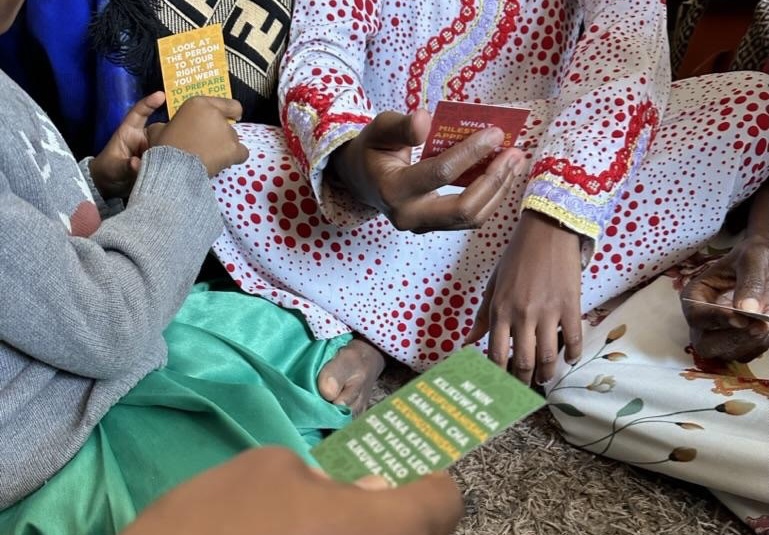
Breaking Down Barriers
Anna has also felt profound positive personal shifts from the impact of the game; the Njoo Tusemezane storytelling cards presented her with a long-awaited opportunity to disclose her own HIV status to her eldest daughter. A moment previously clouded by apprehension and anxiety, metamorphosed into a profoundly emotional and powerful moment in her relationship with her daughter. Anna says the Njoo Tusemezane storytelling cards provided the safe space she needed to have an open conversation, fostering a deeper understanding among family members and paving the way for discussions about topics that have long been buried out of fear, concern, or uncertainty.
“Through this game, I now realize that I can talk to my children, especially the eldest. As their mother, I have been living with HIV for 15 years, and I now know they will understand.”
Anna recognizes the power and potential for storytelling games as an educational and facilitation tool for more open conversations about family planning and HIV in schools, emphasizing that there is great potential for leveraging storytelling techniques for social behavior change in Tanzanian culture. Anna believes that addressing the challenges faced by young people during their formative years is essential for overall well-being over the life course and says sheʼs grateful for the joy and unity the Njoo Tusemezane storytelling game has brought into her own home in her adult life. Through this experience, Anna says she is committed to continue to look for opportunities to harness the power of simple and thoughtful solutions to foster what every human seeks, connection.
The USAID Afya Yangu Northern is designed around client-centered approaches to address gaps in HIV, TB and family planning service delivery, while continuously building and transferring the capacity of local stakeholders for sustainable and country-led ownership.
USAID Afya Yangu Northern focuses intensely on direct service delivery across all regions in early project years, ensuring that gaps to epidemic control are identified, and tailored solutions are designed to meet the needs of vulnerable populations.
Anifa Mgao
Tanzania
Differentiated Approaches
